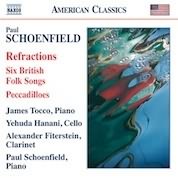Paul Schoenfield’s music blends accessible modernism with sophisticated wit built on a solid foundation of popular, jazz, and Jewish sources, all of which are in evidence in this splendid recording of his chamber music. The title piece, Refractions, is a trio for piano, clarinet, and cello, its four movements based on music from Mozart’s The Marriage of Figaro. But the work doesn’t follow the familiar pattern of paraphrase and variation; rather, as the title suggests, it’s a convoluted take on the opera’s arias and recitatives, the source references often barely discernible even to knowledgeable opera buffs.
The opening Toccata, for example, is based on the opera’s Overture, which is barely alluded to; what sticks in the mind is a lively Hassidic wedding tune. The March movement, based on “Non piu andrai”, hints at Prokofiev, and the final Tarantella reminds this listener of ragtime and the musical accompaniments to a Charlie Chaplin short as much as it does to “Se vuol bailare”. But such eclecticism is what helps to make the piece so laden with surprises and listening excitement.
Schoenfield exploits the harmonic and timbral possibilities of the instrumental combinations such as the unison clarinet/cello in the opening Toccata, and varies the instrumental spotlight to focus on the clarinet cadenza in the Intermezzo, followed by brief solos by the cello and piano. So if Mozart’s hard to discern here, Schoenfield’s individual voice is welcome compensation.
Peccadilloes refers to Rossini’s title for his late piano pieces, Sins of My Old Age, and the melodies of each of its six movements are inspired by, as Schoenfield writes in the disc’s notes, “what is generally considered bad taste or inferior culture.” He advises listening with “the same sort of guilt and pleasure that accompany one while eating a large chocolate sundae.” But Peccadilleos is a lot more than that–it’s a virtuoso piano work that pays homage to great composers and musicians such as Ravel, Gershwin, and the Harlem stride pianists of the 1920s. James Tucco shines here, playing with technicolor sheen in the Gershwinesque Allemande, whose melody parodies the music of old Hollywood romantic comedies, while conveying the excitement of the galloping rhythms and high spirits of the final movement, Boogie.
The disc opens with Six British Folk Songs for cello and piano, a tribute to Jacqueline du Pré. Cellist Yehuda Hanani’s rich tone sings the familiar melodies fluently, investing Schoenfield’s elaborations on them with soulful poignancy in The Gypsy Laddie and virtuoso dynamism in The Lousy Tailor. This disc is a sheer delight from the first note to the last. [6/8/2010]
































